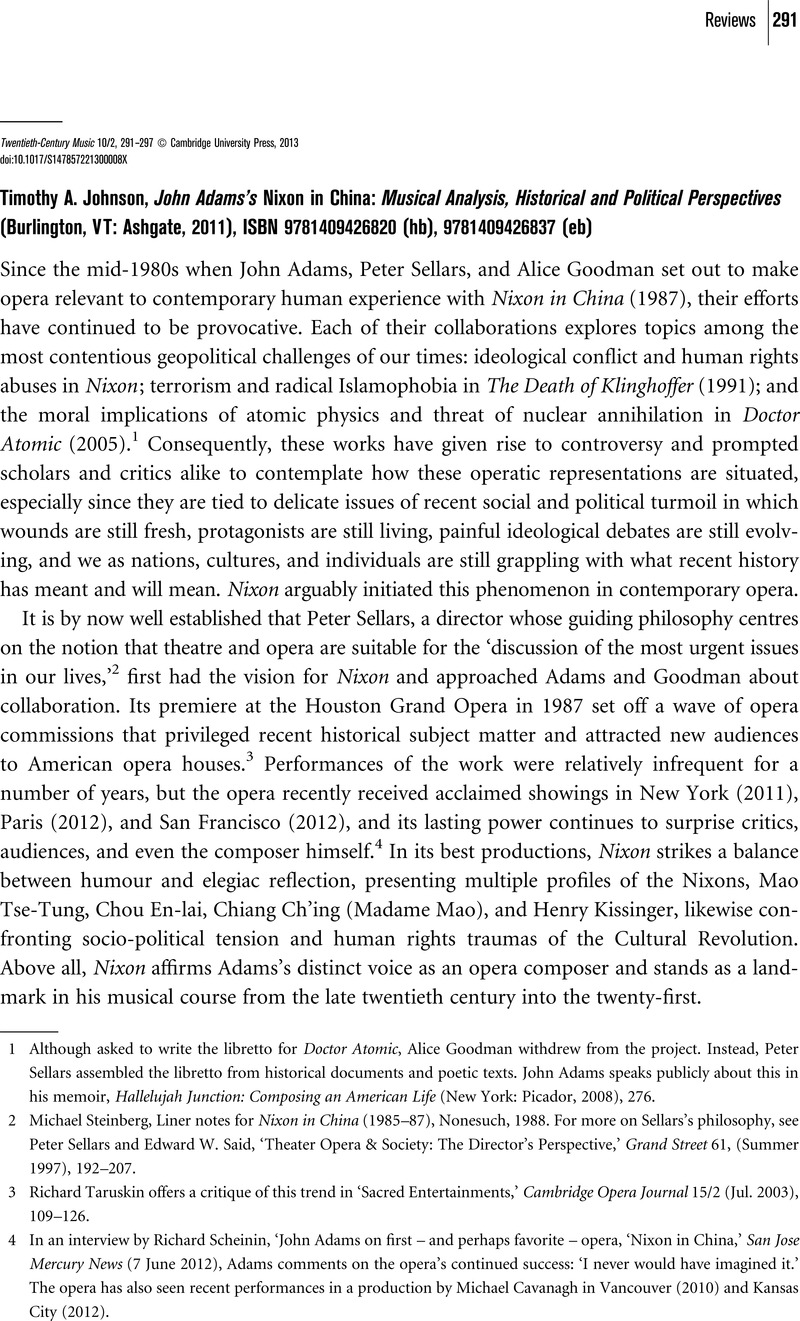No CrossRef data available.
Article contents
Timothy A. Johnson, John Adams's Nixon in China: Musical Analysis, Historical and Political Perspectives (Burlington, VT: Ashgate, 2011), ISBN 9781409426820 (hb), 9781409426837 (eb)
Published online by Cambridge University Press: 12 August 2013
Abstract

- Type
- Reviews
- Information
- Copyright
- Copyright © Cambridge University Press 2013
References
1 Although asked to write the libretto for Doctor Atomic, Alice Goodman withdrew from the project. Instead, Peter Sellars assembled the libretto from historical documents and poetic texts. Adams, John speaks publicly about this in his memoir, Hallelujah Junction: Composing an American Life (New York: Picador, 2008), 276Google Scholar.
2 Michael Steinberg, Liner notes for Nixon in China (1985–87), Nonesuch, 1988. For more on Sellars's philosophy, see Sellars, Peter and Said, Edward W., ‘Theater Opera & Society: The Director's Perspective,’ Grand Street 61, (Summer 1997), 192–207CrossRefGoogle Scholar.
3 Taruskin, Richard offers a critique of this trend in ‘Sacred Entertainments,’ Cambridge Opera Journal 15/2 (Jul. 2003), 109–126CrossRefGoogle Scholar.
4 In an interview by Richard Scheinin, ‘John Adams on first – and perhaps favorite – opera, ‘Nixon in China,’ San Jose Mercury News (7 June 2012), Adams comments on the opera's continued success: ‘I never would have imagined it.’ The opera has also seen recent performances in a production by Michael Cavanagh in Vancouver (2010) and Kansas City (2012).
5 The earliest dissertation on Adams's music is by Timothy A. Johnson, ‘Harmony in the Music of John Adams: From ‘Phrygian Gates’ to ‘Nixon in China,’’ PhD diss. (State University of New York at Buffalo, 1991); followed by Stephan Prock, ‘Reading Between the Lines: Musical and Dramatic Discourse in John Adams's ‘Nixon in China,’’ PhD diss. (Cornell University, 1993); Rebecca Burkhardt, ‘The Development of Style in the Music of John Adams from 1978–1989,’ PhD diss. (University of Texas at Austin, 1993); and Matthew Daines, ‘Telling the Truth about Nixon: Parody, Cultural Representation, and Gender Politics in John Adams's Opera Nixon in China,’ PhD diss. (University of California, Davis, 1995).
6 Sellars, Peter, ‘Creating Contexts: Peter Sellars on Working with Adams,’ in The John Adams Reader: Essential Writings on an American Composer, ed. May, Thomas (Pompton Plains, NJ: Amadeus Press, 2006), 241–42Google Scholar.
7 Johnson (1991), 1. (See full citation above.) Johnson's inquiry takes inspiration from Gregory Sandow's comments about Adams's ‘sudden key-shifts’ in Sandow's essay, ‘Music: Tasting the New Era,’ Village Voice (19 January 1985), 72.
8 Johnson (1991), 10.
9 Johnson, Timothy A., ‘Minimalism: Aesthetic, Style, or Technique?’ The Musical Quarterly 78/4 (Winter 1994), 742–773CrossRefGoogle Scholar.
10 Daines (1995), 37.
11 In the original compact disc liner notes, Goodman discusses her vision for the libretto, noting, ‘everyone should have a voice.’ Alice Goodman, ‘Towards Nixon in China,’ in Nixon in China: An Opera in Three Acts, by John Adams. Compact Disc Liner Notes (Elektra/Nonesuch, 1987–88), 13.
12 Wilson, Dick, Zhou Enlai: A Biography (New York: Viking, 1984), 17Google Scholar.
13 The nature of the relationship between music and what it represents has a long lineage of controversy. Several key texts, though, address some of the concerns raised here. For a critique of the assumptions surrounding musical hermeneutics, for example, see Abbate, Carolyn, ‘Music – Drastic or Gnostic?’ Critical Inquiry 30/3 (Spring 2004), 505–536Google Scholar. Albright, Daniel also offers a stimulating discussion regarding the problems of articulating meaning in music in Music Speaks: On the Language of Opera, Dance, and Song (Rochester, NY: Rochester University Press, 2009)Google Scholar. Writing on issues more closely related to the music of John Adams, Fink, Robert considers minimalist music and representation in a broader cultural context in Repeating Ourselves: American Minimal Music as Cultural Practice (Berkeley and Los Angeles: University of California Press, 2005)Google Scholar.
14 Peter Sellars (2006), 239.




